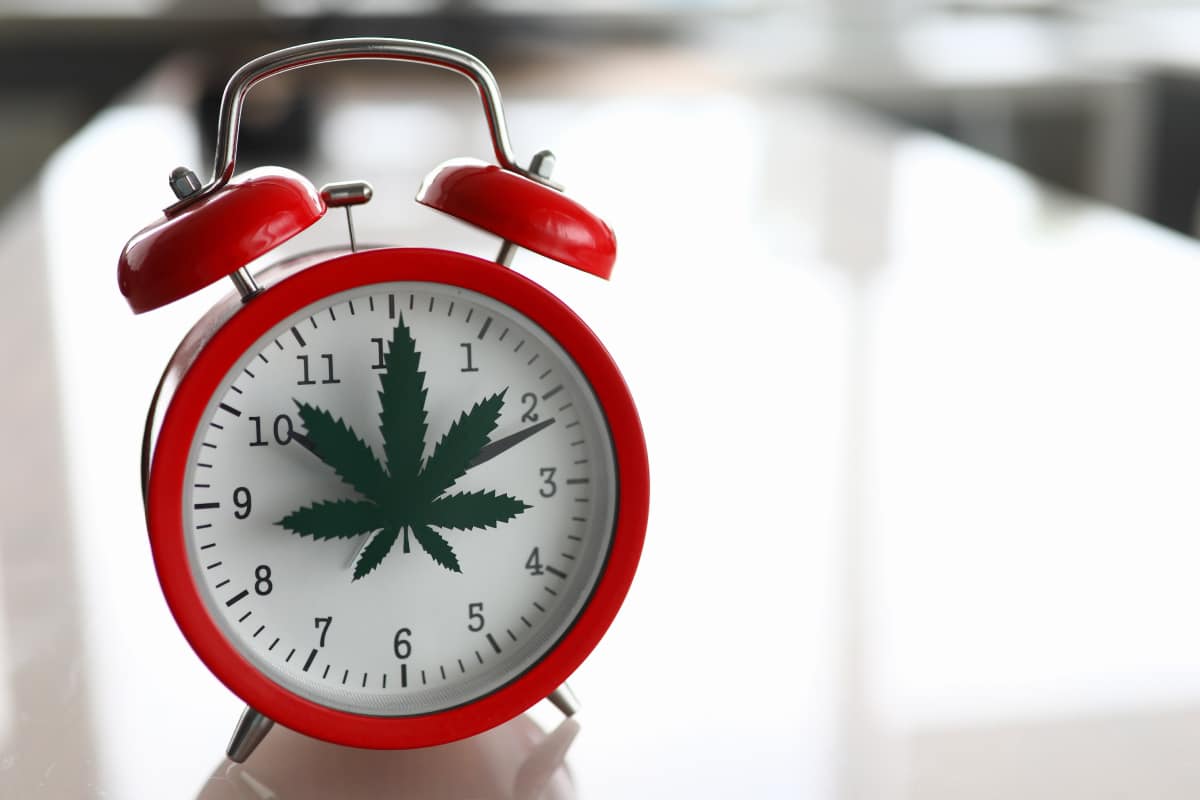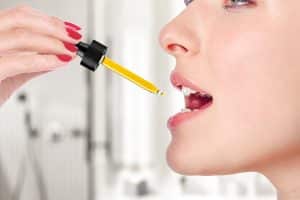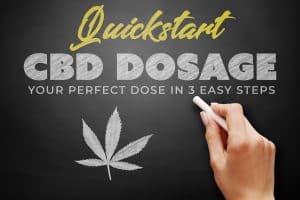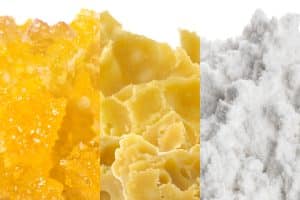How Long Does CBD Stay In Your System: How Fast It Works And How Long It Lasts

How Long Does CBD Stay In Your System: How Fast It Works And How Long It Lasts
One of the most common questions about CBD products like CBD oil is how long it stays in your system after taking it.
The answer to this question is two-fold:
First, we need to know how quickly CBD works and how long peak concentrations of CBD last. And second, we must determine how long CBD stays in your system to where it is detectable in screening procedures like drug testing.
We’ll explore the ins and outs of this topic in today’s article to make sure you have the most up-to-date answers for how long CBD stays in your system. You may also use the table of contents to jump to a section that answers a specific question you have in mind.
How does CBD work?
CBD, or Cannabidiol, is a natural compound called a cannabinoid found in the cannabis plant and has been used for centuries. It’s one of over a hundred cannabinoids identified by scientists.
Research shows that CBD interacts with our central nervous system (CNS) and the endocannabinoid system (ECS). These systems regulate vital functions in the body.
But not all forms of CBD are created equal. For example, some products have higher concentrations of the active ingredient Cannabidiol than others. And different types of CBD blends may contain varying amounts of not just Cannabidiol but of other cannabinoids like CBN (Cannabinol), CBG (Cannabigerol), and CBC (Cannabichromene).
There are also different methods for consuming CBD, such as CBD oil tinctures, CBD capsules, CBD edibles (e.g., gummies, cookies, and other food products), CBD topicals (such as creams, salves, and lotions) as well as CBD vaping e-liquids.
This complex interplay of the combination of cannabinoids, their availability in your CBD blend, and how you consume your CBD will affect how long CBD concentrations last in the body and how long CBD stays in your system.
How long does CBD stay in your system?
You are unique! How long CBD stays in your system will depend on several key factors, such as your metabolism, how much of it you take, and how often you take it.
Generally speaking, CBD and traces of cannabinoid metabolites — the chemical byproducts created when our bodies break down cannabinoids — can take anywhere from one to seven days to get broken down and be removed from the body after an average (25 mg to 50 mg) single dose. Take it more often, and the time CBD stays in your system will increase.
Some studies show that small amounts of CBD may remain detectable in your system for up to 30 days.
Your Body’s Metabolism
Metabolism is an essential consideration that determines how quickly your body absorbs, processes, and removes Cannabidiol.
People with fast metabolisms break down Cannabidiol faster than those with a slower metabolism. Additionally, CBD stays in your system longer if you are overweight. This is because CBD is fat-soluble, and excess fat stores act as a reservoir that slows CBD breakdown and elimination from the body.
Dosage: How Much CBD You Take
Your CBD dosage may affect how long it stays in your system and remains detectable in your body.
Taking a higher CBD dose will result in greater concentrations of cannabinoids that take your body longer to break down compared to smaller amounts.
For example, a person who takes a low dose of 25 mg CBD will metabolize it more quickly than someone who takes a higher dose, such as the 167mg of CBD per dose found in our hyper concentrated CBD oil.
Most experts generally agree that, even after taking high CBD doses multiple times per day, only trace amounts should remain detectable within five to seven days after stopping CBD altogether. But remember that this timeframe could extend up to 30 days after your last CBD dose, depending on factors like metabolism, body weight, and dosage frequency which we will discuss next.
Frequency: How Often You Take It
The frequency of your use also impacts how long CBD stays in your system since regular users build up higher levels over time versus occasional users.
This is because the total Cannabidiol dosage load that your body must break down and remove is higher the more you take CBD, so it could remain detectable in your system longer.
Key Takeaway
CBD can take up to a week to be broken down and removed from the body. This timeframe can vary depending on individual factors such as metabolism, dosage size, and usage frequency. Some studies show that CBD can remain detectable in the body for up to 30 days under certain circumstances.
How fast does CBD oil work and how long does it last in the body
How fast CBD works and how long its concentrations last will depend on the form of CBD you take.
Research shows different forms of CBD have varying levels of bioavailability, absorption, and time-to-peak concentrations. These factors influence how fast CBD will work and how long CBD will last in the body.
Sublingual (CBD Oil)
Bioavailability: 10% to 20%
How fast it works: 60 minutes or less
Time-to-peak concentration: 4 to 6 hours
Taking CBD sublingually means holding it under your tongue for 30 to 60 seconds before swallowing it. Sublingual CBD use works in under an hour and has a high bioavailability of between 10% to 20%. You will notice peak concentration within four to six hours after you take CBD sublingually.
Oral (CBD Oil, capsules, edibles, gummies)
Bioavailability: 6% to 19%
How fast it works: Between 2 to 3 hours
Time-to-peak concentration: 6 to 8 hours
Oral use is the most common way people take CBD. You swallow CBD immediately without holding it under your tongue when you take it orally. CBD bioavailability after taking it orally is comparable to sublingual use at about 6% to 19%. The real difference is how fast oral CBD works (in about two to three hours) and how long it takes to achieve peak concentration (between six to eight hours) after taking CBD orally.
Inhalation (vapes, e-liquids, hemp buds)
Bioavailability: 35% to 56%
How fast it works: Typically within 20 minutes or less
Time-to-peak concentration: 2 to 4 hours
Inhaling CBD either via vaping an e-liquid or smoking the dried CBD flowers in a pipe or similar device offers the highest bioavailability (35% to 56%) and quickest absorption time (20 minutes or less). But CBD inhalation also lasts about half the time with time-to-peak concentrations at about two to four hours following your dose. Using inhalation as your primary dosing method will require more frequent doses to maintain adequate levels because of how rapidly this form is broken down and removed from the body.
Topical (CBD oil, salves, creams, lotions)
Bioavailability: About 5%
How fast it works: 60 minutes or less
Time-to-peak concentrations: 4 to 6 hours
Target specific areas on the body with topical CBD application. This can be achieved with CBD-infused salves, creams, lotions, and oils.
Topical CBD use has the lowest bioavailability of common delivery methods, with about 5% of the topically applied CBD dose absorbed into your system. Time-to-peak concentration is about four to six hours after applying CBD topically.
Key Takeaway
Everybody is unique and responds to CBD a little differently. How fast CBD works and how long it will stay in your system depends mainly on how you take it. Sublingual dosing and inhalation work the fastest because they have the highest bioavailability and absorption rates, though they have a lower peak effect duration. When taken orally, CBD oil, softgel capsules, edibles, and gummies work relatively quickly, and peak concentrations last for up to 8 hours.
What are the different ways to take CBD?
Now that you understand bioavailability, absorption time, and peak concentrations, you can use this information to find the right CBD product for you!
SHOP: USDA organic certified CBD products
Here is a list of the most popular CBD products, how to take them, and how long their concentrations will stay in your system.
CBD Oil
CBD oil is the most versatile way to take Cannabidiol because it can be used sublingually, swallowed orally, or applied topically onto the skin — the perfect all-in-one CBD solution.
Taking CBD oil sublingually is 10% to 20% bioavailable and absorbed by the body in one hour or less. Time-to-peak concentrations are about four to six hours.
Oral CBD oil use, in which you swallow it immediately, is 6% to 19% bioavailable and absorbed by the body within two to three hours. Time-to-peak concentrations of oral CBD use are between six to eight hours.
Because Organica Naturals certified organic CBD Oil is formulated with MCT oil, it can be applied directly to target areas on your body (think your face, shoulders, elbows, knees, feet, and anywhere in between)! Though bioavailability is about 5% with topical use, it is absorbed quickly within one hour, and peak concentrations can be experienced over four to six hours.
CBD Softgel Capsules
CBD softgels are made with a concentrated CBD oil encapsulated into a gelatin outer shell. Softgels are often used because they are mess-free and offer easy, convenient dosing in 25 mg increments.
Taking CBD softgels by mouth provides the same bioavailability (6% to 19%) and absorption rate (between two to three hours) as CBD oil taken orally, with time-to-peak concentrations at six to eight hours.
CBD Edibles
CBD can be blended into almost any food, including honey sticks and desserts. Edibles are intended to be taken orally and have an absorption and peak effect time similar to CBD oil and CBD softgels.
CBD Gummies
Taking a CBD gummy is becoming one of the most popular new forms of consuming CBD in edible form — who doesn’t love a sweet treat that tastes delicious and helps them feel better? Like CBD capsules and softgels, CBD gummies make it easy to know exactly how much Cannabidiol you’re getting because every dose is premeasured with a standard 25 mg or 50 mg dosage range. Like other edibles, the absorption time for a CBD gummy is up to three hours, with time-to-peak concentrations that last up to eight hours in your system.
CBD Vapes and e-Liquids
CBD inhalation is a somewhat controversial way of taking CBD because of the perceived ill health effects from smoke or vapor clouds.
Nonetheless, many CBD users prefer inhalation as their primary dosing method because it has the highest bioavailability, works fast, and is very convenient.
Absorption after CBD inhalation is exceptionally rapid (20 minutes or less). Total absorption time may vary depending on the user and could take up to one hour, though it is very uncommon for inhaled CBD to take that long to work. Time-to-peak concentrations following CBD inhalation are between two to four hours.
CBD Topicals
Topicals make targeting specific areas of the body a breeze because CBD can be applied anywhere you need it. Cannabidiol and other cannabinoid compounds in your topical CBD preparation are readily absorbed into the skin in one hour or less, with time-to-peak concentrations in four to six hours.
Key Takeaway
How you choose to take CBD will impact how quickly it works and how long it lasts. The most popular way to take Cannabidiol is a CBD oil because it can be taken sublingually for rapid absorption, taken orally for more prolonged peak concentrations, or applied directly to target areas on the skin to give relief exactly where you need it.
Does CBD show up on drug tests?
There is a considerable amount of confusion surrounding CBD and drug tests, primarily because CBD is often mixed up with the psychoactive component of marijuana, THC.
Most people are concerned that taking a CBD product will cause them to test positive on a drug screening. This may be true in some instances, but it depends on three factors:
- The type of CBD product you take
- How much THC that product contains
- What kind of drug screening is used to test you
Drug tests do not normally test for cannabinoids other than THC-related compounds like Delta-9-THC and Delta-8-THC. So, if you take CBD with no THC, a standard drug screening should not trigger a positive test result.
Rarely, drug tests may also screen for non-psychoactive cannabinoids like CBD. If a drug test looks for CBD and you’ve taken it within the past seven to 30 days, it may show a positive result. It will not, however, show a positive result for THC unless this cannabinoid is present in the product you are taking.
Understanding the Differences In CBD Types
The type of CBD you take makes all the difference when it comes to passing your drug test.
There are three main types of CBD from which to choose:
- Full Spectrum CBD
Contains no more than the federal legal limit of 0.3% THC - Broad Spectrum CBD
Contains no detectable THC at 0.0% - Pure Isolate CBD
Contains no other cannabinoids and no detectable THC (0.00%)
Each CBD type above undergoes similar extraction and filtration processes to transfer the CBD and other cannabinoids from the plant into your CBD product. But there are some important distinctions between the three.
Understanding how they differ will help you choose the right type of CBD based on your specific needs, expectations, and concerns regarding drug testing.
Full Spectrum CBD Oil
Full Spectrum CBD oil is the world’s number one type of CBD.
It’s the most sought-after CBD type because it undergoes the least processing and filtration, so it contains all of the major and minor cannabinoids in the hemp plant, including THC. More cannabinoids lead to improved effectiveness through a natural phenomenon scientists have dubbed the entourage effect.
The entourage effect describes how the various cannabinoids in full spectrum CBD work together.
Federal and state laws in the USA require that over-the-counter full spectrum CBD blends limit THC content to 0.3% or less.
The legal THC limit for over-the-counter CBD is nowhere near enough to cause psychoactive side effects, but even that small an amount may be enough to trigger a positive result on very sensitive drug tests.
You should not take full spectrum CBD products if you expect to take a drug test in the next 30 days.
Broad Spectrum CBD Oil
Broad spectrum CBD oil is similar to its full spectrum counterpart, except it undergoes an additional filtration process to remove THC to the point that it is undetectable in lab testing with cutoff limits set at 0.0%.
This extra step also removes a small percentage of minor cannabinoids, making it slightly less effective than full spectrum CBD in clinical studies.
Even though the levels of THC are not detectable in lab tests, consuming broad spectrum CBD blends may lead to a positive drug test result for THC because there are still minuscule amounts of THC present in these products (0.00% or less).
Overall, broad spectrum CBD is an excellent choice if you prefer to avoid detectable levels of THC. But it is not recommended for people who expect to take a drug test in the next 30 days.
Pure Isolate CBD Oil
Isolate CBD oil is radically purified using multiple filtration processes to remove everything but the single-molecule cannabinoid CBD. Typically, no other cannabinoids — not even THC — are detectable in isolated CBD products except for CBD.
For a blend to be considered a pure isolate, such as the Zero High Pure Isolate CBD Oil, third-party lab tests must show undetectable levels of THC with cutoff limits set at 0.00% THC.
Pure isolate CBD products are recommended for people who are concerned with a positive drug screening for THC.
Which type of CBD should I take if I am drug tested?
The short answer is a pure CBD isolate product because these have no detectable levels of THC in lab tests with cutoff limits set to 0.00%.
Typically, drug tests do not look for cannabinoids other than THC-related compounds like Delta-9-THC and Delta-8-THC. So, if you take pure CBD with no THC, your drug screening should not show a positive test result.
Rarely, drug tests may screen for non-psychoactive cannabinoids like CBD. If a drug test looks for CBD and you’ve taken it within the past seven to 30 days, it may show a positive result. It will not, however, show a positive result for THC unless this cannabinoid is also in the product you are taking.
How much THC is in your system will determine whether or not you will trigger a positive result on your drug test. Taking full spectrum CBD or broad spectrum CBD products presents too significant a risk for testing positive for THC, especially if the drug screening has cutoff limits that are highly sensitive to tetrahydrocannabinol (THC) metabolites.
You should avoid CBD products labeled “full spectrum” or “broad spectrum” if you know you will be drug tested in the next 30 days.
Key Takeaway
The type of CBD product you take and the amount of THC it contains will determine whether or not it will show up on a drug test. Check labels carefully before consuming any cannabinoid-based hemp product, especially if you know you will be drug tested in the next 30 days.
How Long Does CBD Stay In Your System FAQ
Browse the following frequently asked questions and answers to better understand how long CBD stays in your system, how fast CBD works, and how long CBD lasts.
Do you have a question that we haven’t answered? Chat with a CBD Wellness Advisor today.
Will CBD show up on a drug test?
No, most drug tests do not test for cannabinoids other than psychoactive THC-related compounds like Delta-9-THC and Delta-8-THC.
Rarely, drug tests may screen for non-psychoactive cannabinoids like CBD. If a drug test screens for CBD and you’ve taken it within the past seven to 30 days, it may show a positive result. It will not, however, show a positive result for THC unless this cannabinoid is also present in the product you are taking.
How long does full spectrum CBD stay in your system?
Full spectrum CBD blends contain a number of cannabinoids, including CBD (Cannabidiol), CBN (cannabinol), CBG (cannabigerol), CBC (cannabichromene), and THC (tetrahydrocannabinol).
Depending on your metabolism, dosage amount, and frequency of use, these compounds commonly stay in your system for a period of one to seven days following your last use.
In some instances, they may be detectable in your body for up to 30 days after your last dose, especially if you take CBD often or if you take higher-than-average doses of CBD.
How long does THC stay in your system?
While over-the-counter full spectrum CBD oils like those available from Organica Naturals CBD contain very low levels of THC (less than 0.3%), it is still possible that sensitive drug screenings may detect this compound resulting in a positive drug screening result.
Studies show that THC, even in small amounts, may remain in your system for seven to 30 days after your last use.
How long should you stop CBD before a drug test?
You should stop taking CBD products that contain detectable levels of THC at least 30 days before a drug test to ensure that you pass. The 30-day time frame is an adequate period that allows your body to break down and remove all THC metabolites — the chemical byproducts created when our bodies break down tetrahydrocannabinol (THC) — so you can be confident that you will pass your drug test.
How long does a CBD high last?
CBD will never get you high — no matter how much you take — because CBD is non-intoxicating and not psychoactive.
Peak concentrations of CBD occur between two to eight hours, depending on the form you take and how you take it.
How long is CBD detectable in urine?
Drug tests rarely screen for non-psychoactive cannabinoids like CBD. Still, if the drug test you will take looks for the presence of CBD, you should know that it may remain detectable in your system for one to seven days if you are an occasional user and for up to 30 days if you are a regular or frequent user.
How long is CBD detectable in blood?
CBD has been detected in blood tests in as little as five hours after first use. These levels dissipated significantly over 72 hours and were no longer detectable by blood tests after 3 ½ days of use regardless of dosage amount or frequency of use.
How long is CBD detectable in saliva?
CBD is detectable for up to three days in saliva tests, especially with regular or frequent CBD use.
How long is CBD detectable in hair?
Hair strand screenings can trigger a positive result for CBD for up to 90 days.
How much CBD is too much?
CBD is a forgiving natural hemp extract, so taking higher doses does not lead to significant adverse side effects or overdose when the manufacturer’s dosage guidelines are followed.
It is, however, possible to take too much CBD, and doing so may lead to side effects like dry mouth, headaches, stomach upset, and dizziness. That’s why you should always start low and go slow when first beginning CBD.
The Organica Naturals CBD Dosage Guide suggests starting with a low dose of 0.25mg per pound of body weight for the first several days to see how your body responds. You may increase your dose as needed until you reach your optimal daily usage based on how you feel CBD is working for you.
Clinical research suggests that the maximum dose of CBD is 1.5mg of Cannabidiol per pound of body weight. Exceeding this amount can lead to unwanted side effects.
If you experience side effects when taking CBD, it is recommended that you discontinue use.
Speak with a healthcare professional if you intend to take more than the suggested maximum daily dose of CBD.











